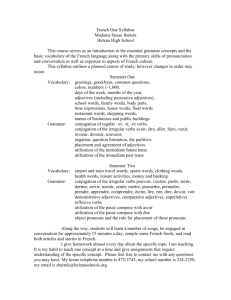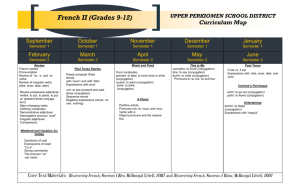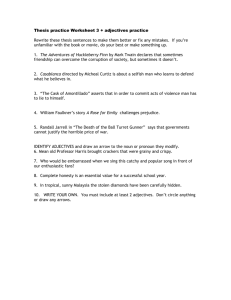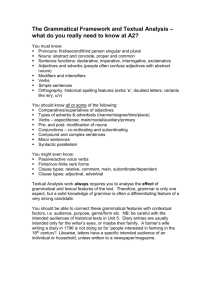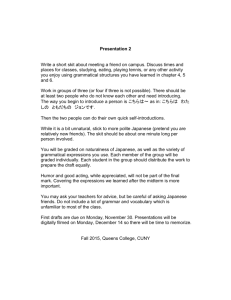Students ask or tell where someone is from and describe him/herself
advertisement
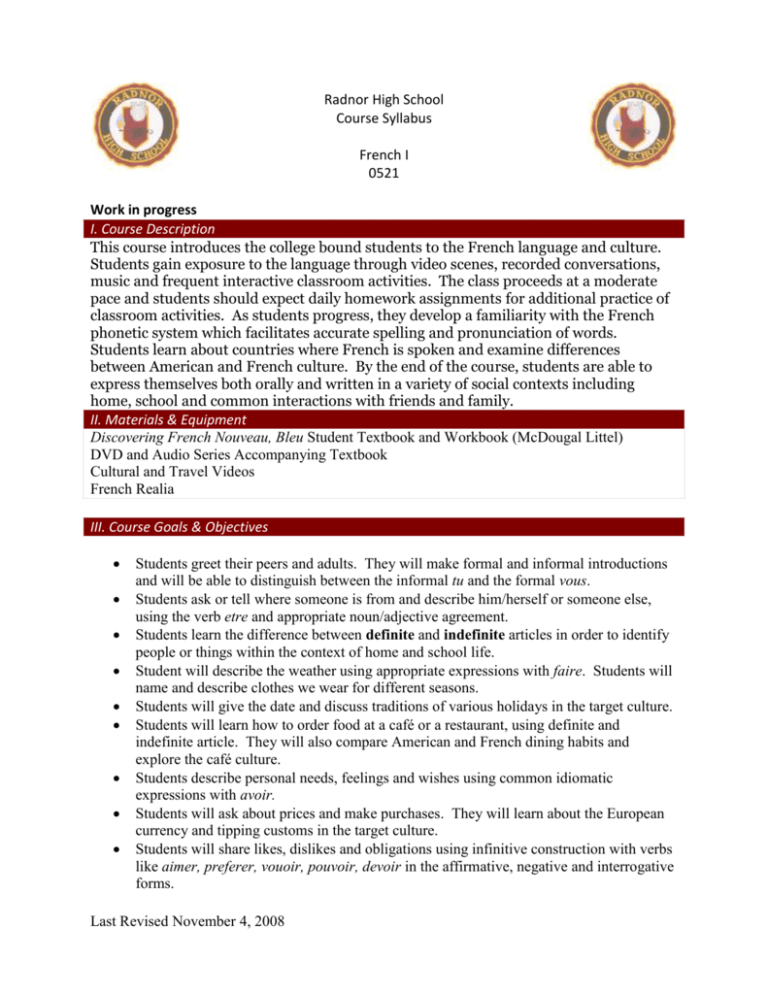
Radnor High School Course Syllabus French I 0521 Work in progress I. Course Description This course introduces the college bound students to the French language and culture. Students gain exposure to the language through video scenes, recorded conversations, music and frequent interactive classroom activities. The class proceeds at a moderate pace and students should expect daily homework assignments for additional practice of classroom activities. As students progress, they develop a familiarity with the French phonetic system which facilitates accurate spelling and pronunciation of words. Students learn about countries where French is spoken and examine differences between American and French culture. By the end of the course, students are able to express themselves both orally and written in a variety of social contexts including home, school and common interactions with friends and family. II. Materials & Equipment Discovering French Nouveau, Bleu Student Textbook and Workbook (McDougal Littel) DVD and Audio Series Accompanying Textbook Cultural and Travel Videos French Realia III. Course Goals & Objectives Students greet their peers and adults. They will make formal and informal introductions and will be able to distinguish between the informal tu and the formal vous. Students ask or tell where someone is from and describe him/herself or someone else, using the verb etre and appropriate noun/adjective agreement. Students learn the difference between definite and indefinite articles in order to identify people or things within the context of home and school life. Student will describe the weather using appropriate expressions with faire. Students will name and describe clothes we wear for different seasons. Students will give the date and discuss traditions of various holidays in the target culture. Students will learn how to order food at a café or a restaurant, using definite and indefinite article. They will also compare American and French dining habits and explore the café culture. Students describe personal needs, feelings and wishes using common idiomatic expressions with avoir. Students will ask about prices and make purchases. They will learn about the European currency and tipping customs in the target culture. Students will share likes, dislikes and obligations using infinitive construction with verbs like aimer, preferer, vouoir, pouvoir, devoir in the affirmative, negative and interrogative forms. Last Revised November 4, 2008 Students will tell which subjects they study at school. Students will use time expressions to discuss their daily schedules using both the 12 and 24 hour clock. Students compare the French and American school systems. Students will learn to make invitations to others as well as how to accept or refuse an invitation. Students will describe their daily activities using regular –er verbs. Students will share likes and dislikes and ask and answer questions about where others are and what they are doing. Students will describe themselves, family members and friends. They will indicate physical and personality traits using the appropriate noun/adjective agreement and position. They will use appropriate possessive adjectives and indicate possessions using de. Students will describe their city, public buildings and places of interest. Students will use the verb aller and the preposition à with appropriate contractions to talk about various places they go during the week and on the weekends. Students will compare a typical weekend of a teeanager in the United States to the experiences of teenagers in France. They will also talk about places/activities they have come from using the verb venir with the preposition de and appropriate constructions. Students will learn about the city of Paris and its major historical monuments and cultural attractions. Students will ask for and give directions using the appropriate form of the imperative. Students will describe their home and compare housing and family life in France and the United States. Students will discuss future plans and say what they plan to do using the future proche construction as well as indicate activities they have just finished using the immediate past construction. Students will point out and inquire about certain people, classroom and household objects using the adjectives quel, ce and tout. Students will use regular er, ir, re verbs to describe individuals’ choices, behavior, and common activities within the context of home, school community and family. Students will explore aspects of francophone culture in select provinces, overseas departments and countries and including Martinique, Sénégal, Haïti, Québec. IV. Course Topics (Summary Outline) Unit I – Faisons Connaissance A. Communicative Activities 1. Greetings and how we feel 2. Introducing family and friends 3. Where you are from 4. Classroom expressions and Objects 5. Counting and the Calendar 6. Discussing Age B. Grammatical Concepts 1. Alphabet and French phonetics 2. Être and Avoir – Singular Conjugation 3. ça va expressions 4. Masculine/Feminine of Adjectives Last Revised November 4, 2008 5. Definite/Indefinite Article (singular only) 6. Singular Posessive Adjectives (my/your/his/her) 7. Basic Commands C. Cultural Topics 1. Greeting and addressing someone formally/informally 2. Map of France 3. The Francophone Countries of the World Unit II – Invitation au français A. Communicative Activities 1. Ordering snacks and beverages 2. Asking about prices and paying for food/drink 3. Telling time 4. Giving the day/date 5. Discussing the weather B. Grammatical Concepts 1. Expressions with Avoir (singular conjugation only) 2. Interrogatives with quel/combien 3. Negation 4. Expressions with Être (en avance/à l’heure…) 5. Faire Expressions with weather C. Cultural Topics 1. European currency 2. Tipping 3. Military time in France 4. Parisian attractions 5. Café Culture vs. Starbucks Unit III – Qu’est-ce qu’on fait? A. Communicative Activities 1. Describing daily activities 2. Saying what we like and dislike doing 3. Asking and answering questions about where others are and what they are doing 4. Making and responding to invitations B. Grammatical Concepts 1. Infinitive construction with aimer/préférer/vouloir/pouvoir/devoir/savoir 2. Être conjugation (Singular and Plural) 3. Using tu/vous 4. Common prepositions 5. Additional expressions with Etre (être d’accord…) 6. Conjugation of ER verbs 7. Basic adverbs 8. Interrogatives and Inversion 9. Conjugation and Expressions with Faire C. Cultural Topics 1. Pastimes in France for Teenagers Last Revised November 4, 2008 2. French School System Unit IV – Le Monde Personnel et Familier A. Communicative Activities 1. Describing yourself and friends – personality and physical traits 2. Discussing/Describing your room and everyday possessions 3. Describing Objects – size and color B. Grammatical Concepts 1. Adjectives – Agreement and Position (BAGS) 2. Expression Il y a 3. Common Prepositions 4. Plural of Definite and Indefinite Articles (Affirmative and Negative) 5. Definite Article for likes/dislikes 6. C’est vs. Il/Elle est C. Culutural Topics 1. Virutal visit to Haiti through video, readings and interent 2. Holiday Traditions in France 3. Le Scooter Unit V – En Ville A. Communicative Activities 1. Describing your city, public buildings and places of interest 2. Asking and giving directions 3. Talking about various places you to during the week and on weekends 4. Describing your home 5. Discussing future plans 6. Talking about friends and family members 7. Writing a personal letter in French B. Grammatical Concepts 1. Aller conjugation 2. The preposition à with contractions 3. The preposition chez 4. Infinitive construction with aller, vouloir, pouvoir, savoir 5. Venir conjugation 6. The preposition de with contractions 7. Tonic Pronouns 8. Compound nouns with de 9. Possession with de and Possessive Adjectives C. Cultural Topics 1. A virtual tour of Paris – the “BIG C and little c” culture of Paris. 2. Europe vs. the United States, characteristics of a “la vieille ville”. Unit VI – Le Shopping A. Communicative Activities 1. Naming and describing clothes you wear 2. Discussing style 3. Shopping for clothes and other items B. Grammatical Concepts Last Revised November 4, 2008 1. Acheter , préférer – conjugation and stem changers 2. The demonstrative and interrogative adjectives ce and quel 3. Mettre(and related verbs) conjugation 4. Irregular Adjectives (BAGS) –form and position C. Cultural Topics 1. Le centre commercial, le grand magasin et la boutique 2. Sizes and shopping etiquette in France V. Assignments & Grading Formative assessment: Daily homework assignments Participation in class Spontaneous exchanges (teacher to student, student to student, student to teacher) Frequent oral and written quizzes Reading and listening comprehension exercises Recitations Summative assessment: Unit tests, mid-term and final exam Skits and dialogues Letters and Compositions Creative projects Last Revised November 4, 2008
